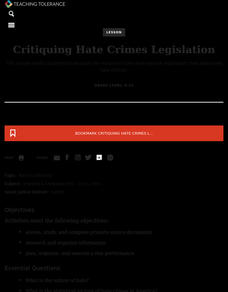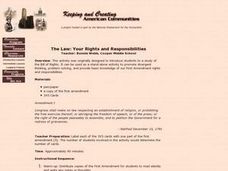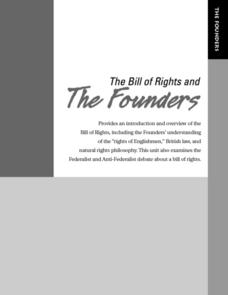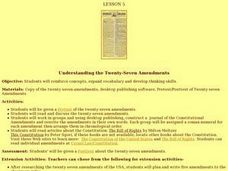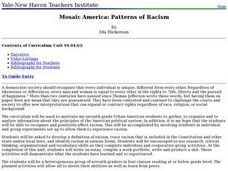Curated OER
The Constitution
A study of the Constitution can lead students into an exploration of civil rights, laws, and history.
Curated OER
Current Events and the Constitution
Understanding the Constitution is critical to helping students become valuable and engaged members of society.
Curated OER
Family Law - Child Abuse
Students identify and examine children's protective rights provided by law, discuss difficulties of determining whether child is abused or neglected, identify types of child abuse and neglect, analyze hypothetical situations to determine...
Curated OER
The Supreme Court: The Judicial Power of the United States
Students investigate some basic facts about the Supreme Court by examining the United States Constitution and one of the landmark cases decided by that court. The operation of the Supreme Court forms the focus of the lesson.
National Endowment for the Humanities
George Washington: The Precedent President
Everyone knows that George Washington was the first president, but do your scholars know why that was so important? The lesson plan, the third in a sequence of three, allows learners to understand how George Washington set a precedent...
Teaching Tolerance
Critiquing Hate Crimes Legislation
The high school lesson explores what hate crimes are and how the government has responded to those crimes. Academics read legislation, analyze political cartoons, and complete hands-on-activities to understand what motivates individuals...
Judicial Branch of California
The Power of the Press: The First Amendment
Was what happened in 1886 at the Haymarket riot a crime or a case of xenophobia? Using political cartoons from the time, young historians consider the role the media played in anti-labor sentiment during the time and how that influenced...
NPR
Civil Rights of Japanese-American Internees
Prompted by a viewing of Emiko and Chizu Omori’s Rabbit in the Moon, a documentary about the internment of Japanese-Americans during World War II, high schoolers examine a series of documents, including the Bill of Rights and the UN’s...
Facing History and Ourselves
The Importance of a Free Press
"Congress shall make no law . . . abridging the freedom of speech, or of the press;. . ." Why is this guarantee of free speech and a free press the First Amendment to the US Constitution? Why are these rights so essential to a...
University of California
Equal Rights? The Women's Movement from Suffrage to Schlafly
If you've never heard of the Equal Rights Amendment, it's probably because there isn't one in the United States Constitution. Delve into the contentious history behind the ERA, its founders and supporters, and reasons for its political...
Curated OER
How a Bill Becomes a Law
Pupils make a chart on what they learned about how a bill becomes a law. For this law making lesson plan, students research the authority and restrictions placed on Congress on how they make a bill into a law and then present their...
Curated OER
The Law: Your Rights and Responsibilities
Students explore First Amendment rights and responsibilities.
Curated OER
Constitutional Crossword Puzzle
For this constitutional worksheet, students review, discuss and answer nine clues regarding the constitution and then place each answer in a crossword puzzle.
Curated OER
Constitution Search
In this Constitution worksheet, students search the Constitution for details and answer short answer questions about it. Students answer 11 questions.
Curated OER
Would You Live Common Law?
Students explore common law. In this sociology lesson, students discover what constitutes common law unions in Canada and then discuss how common law relationships compare to marriages.
Curated OER
The Supremes
High schoolers discuss steps cases go through to reach Supreme Court, examine Bill of Rights, and rank rights in order of importance to them. Students then research Supreme Court case dealing with one of first ten amendments, and write...
Curated OER
Get to Know Your Bill of Rights
Sixth graders research and examine the first ten amendments to the Constitution of the United States of America. They sequence events significant to this time period, read and discuss text, and in small groups prepare and present the...
Curated OER
The Bill of Rights and the Founders
Students explain similarities between historical statements of rights and their modern applications, explore ideas of "Rights of Englishmen" and natural rights, discuss evolution of concept of rights and its impact on Bill of Rights,...
Curated OER
Understanding the Twenty-Seven Amendments
Students use the Internet to learn about the Constitution. For this Constitutional Amendments lesson, students read and discuss the twenty seven amendments and work in groups to rewrite the amendments in their own words. ...
Curated OER
Is It Right to Bear Arms?
Learners explore the debate on how to curb gun violence in America. They prepare an argument for or against a strict interpretation of the Second Amendment of the United States Constitution and participate in a debate.
Curated OER
Mosaic America: Patterns of Racism
Seventh graders use print and electronic resources to gather and analyze information on the political system in the United States. Using the Constitution, they identify and discuss instances of racism included in amendments and laws. ...
Curated OER
School Bill of Rights
Students study the Bill of Rights. As a class, they create a "School Bill of Rights," with amendments. Students discuss the difference between rights and responsibilities and examine Supreme Court decisions dealing with the first ten...
National Endowment for the Humanities
Lesson 2: Chief Executives Compared: The Federalist Papers
Fix the Articles of Confederation or develop a new constitution? That was the question facing the Founding Fathers. Several of those in favor of a new constitution published a series of essays, collected in the Federalist...
Curated OER
A Nation's Voice
Students research the Constitution and the War Powers Act in order to determine what the powers of the government are in times of conflict. They answer a series of questions then write a legal brief either supporting or condemning the...







